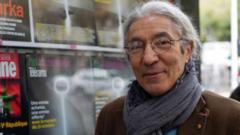The trial marks a significant moment in the fight against sexual violence, as Gisèle Pelicot's courageous decision to make her story public resonates globally.
Gisèle Pelicot Honored by Macron for Her Pioneering Role in Landmark Mass Rape Trial

Gisèle Pelicot Honored by Macron for Her Pioneering Role in Landmark Mass Rape Trial
French President Recognizes Pelicot's Bravery in Publicizing Her Ordeal
In a poignant acknowledgment of her bravery, French President Emmanuel Macron has expressed gratitude to Gisèle Pelicot, honoring her remarkable strength during a harrowing mass rape trial involving her ex-husband and 50 other defendants. Macron lauded Pelicot as a "trailblazer for women," emphasizing the profound impact of her "dignity and courage" on France and beyond.
Dominique Pelicot, 72, received a 20-year sentence for aggravated rape after confessing to drugging his wife for years and coercing numerous men into sexually assaulting her while she was incapacitated. Following the verdicts against all 51 men involved, Gisèle Pelicot reflected on the trial's emotional challenges but held onto hope for a future defined by mutual respect and understanding between genders.
By openly breaking the silence surrounding her trauma, Pelicot spotlighted critical issues such as rape and drug-facilitated sexual violence, capturing worldwide attention. While the court handed down varying sentences, her children expressed disappointment at the perceived leniency of the penalties versus the maximum terms requested.
Immediately, 41 of the men were incarcerated, with expected appeals looming on the horizon. Legal representatives noted a disheartened reaction from Pelicot's ex-husband regarding his sentence, which requires he serve two-thirds before parole eligibility.
Throughout the proceedings, advocates against sexual violence rallied outside the courthouse, hoping the trial would prompt necessary reforms in France's rape laws and alter societal conversations about sexual assault. As the slogan "Shame changes sides" gained traction, German Chancellor Olaf Scholz commended Pelicot for empowering women around the globe, reiterating that the shame rests solely with those who commit the acts.
Pelicot's lawyer underscored the trial's significance as a stepping stone for societal reflection and progress, while prominent political figures, including France's National Assembly president and ex-prime minister, emphasized the necessity of addressing these issues at the educational level for younger generations.
Dominique Pelicot, 72, received a 20-year sentence for aggravated rape after confessing to drugging his wife for years and coercing numerous men into sexually assaulting her while she was incapacitated. Following the verdicts against all 51 men involved, Gisèle Pelicot reflected on the trial's emotional challenges but held onto hope for a future defined by mutual respect and understanding between genders.
By openly breaking the silence surrounding her trauma, Pelicot spotlighted critical issues such as rape and drug-facilitated sexual violence, capturing worldwide attention. While the court handed down varying sentences, her children expressed disappointment at the perceived leniency of the penalties versus the maximum terms requested.
Immediately, 41 of the men were incarcerated, with expected appeals looming on the horizon. Legal representatives noted a disheartened reaction from Pelicot's ex-husband regarding his sentence, which requires he serve two-thirds before parole eligibility.
Throughout the proceedings, advocates against sexual violence rallied outside the courthouse, hoping the trial would prompt necessary reforms in France's rape laws and alter societal conversations about sexual assault. As the slogan "Shame changes sides" gained traction, German Chancellor Olaf Scholz commended Pelicot for empowering women around the globe, reiterating that the shame rests solely with those who commit the acts.
Pelicot's lawyer underscored the trial's significance as a stepping stone for societal reflection and progress, while prominent political figures, including France's National Assembly president and ex-prime minister, emphasized the necessity of addressing these issues at the educational level for younger generations.





















